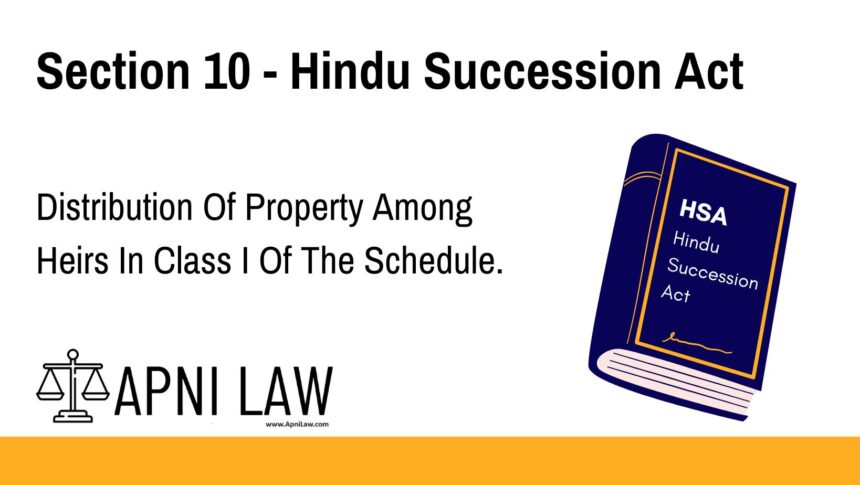Code: Section 10 – Hindu Succession Act
10. The property of an intestate shall be divided among the heirs in Class I of the Schedule in accordance with the following rules:
Rule 1. The intestate’s widow, or if there are more widows than one, all the widows together, shall take one share.
Rule 2. The surviving sons and daughters and the mother of the intestate shall each take one share.
Rule 3. The heirs in the branch of each pre-deceased son or each pre-deceased daughter of the intestate shall take between them one share.
Rule 4. The distribution of the share referred to in Rule 3 shall be made as follows:
- (i) Among the heirs in the branch of the pre-deceased son, the widow (or widows together), and the surviving sons and daughters shall get equal portions; and the branch of his pre-deceased sons gets the same portion.
- (ii) Among the heirs in the branch of the pre-deceased daughter, the surviving sons and daughters shall get equal portions.
Explanation of Section 10 – Hindu Succession Act
Section 10 provides a detailed framework for distributing the property of a Hindu male who dies intestate among his Class I heirs. The distribution follows a set of rules designed to ensure fairness and equality among heirs, including the widow, children, and the descendants of any pre-deceased children. The section contains four key rules:
Rule 1: Widow’s Share
- The intestate’s widow (or widows, if there are multiple) will receive one share of the property.
Rule 2: Surviving Sons, Daughters, and Mother
- The surviving sons, daughters, and mother of the intestate shall each receive one share of the property.
Rule 3: Heirs in the Branch of a Pre-deceased Son or Daughter
- If a son or daughter of the intestate has passed away before the intestate, the heirs in that deceased branch (children of the pre-deceased son or daughter) shall collectively receive one share of the property.
Rule 4: Distribution Among Branches of Pre-deceased Children
- For pre-deceased sons, the share will be divided equally among the widow(s), surviving sons, and daughters. This ensures that each surviving member of the pre-deceased son’s family receives an equal portion.
- For pre-deceased daughters, the share will be equally divided among the surviving sons and daughters of that branch.
Illustration
Example 1: Distribution Among the Intestate’s Family
- A Hindu male dies intestate, leaving behind one widow, two sons, two daughters, and his mother. According to Section 10, the property will be divided as follows:
- The widow receives one share.
- Each son, daughter, and mother receives one share.
Thus, the total number of shares in the estate will be divided equally among these individuals.
Example 2: Distribution Among the Branch of a Pre-deceased Son
- The intestate has a pre-deceased son, who left behind a widow and two children. According to Rule 3 and Rule 4, the property is divided:
- The widow and children of the pre-deceased son will share the single share allotted to that branch, with equal portions going to the widow and children.
Example 3: Distribution Among the Branch of a Pre-deceased Daughter
- The intestate’s daughter pre-deceased him and left behind two children. The property allocated to the daughter’s branch will be divided equally between the surviving sons and daughters of that branch.
Common Questions and Answers on Section 10 – Hindu Succession Act
1. How is the property distributed if the intestate has multiple widows?
- Answer: If the intestate has multiple widows, they together will receive one share of the property, which will be divided equally among them.
2. What happens if a son or daughter has pre-deceased the intestate?
- Answer: The heirs in the branch of the pre-deceased son or daughter will take one share of the property, which will be distributed equally among them, as per the rules specified.
3. Do the children of a pre-deceased son or daughter get equal shares?
- Answer: Yes, the children of a pre-deceased son or daughter will inherit the share of that branch equally, ensuring fairness.
4. How is the distribution handled when both sons and daughters survive the intestate?
- Answer: The property is divided equally between all surviving sons, daughters, and the mother, with each receiving one share.
Conclusion
Section 10 of the Hindu Succession Act ensures an equal distribution of property among the Class I heirs of the intestate. It highlights the fair treatment of widows, surviving children, and the descendants of pre-deceased children. The rules set out in this section are designed to ensure that family members inherit in an equitable manner, considering both the surviving and deceased branches of the family.








